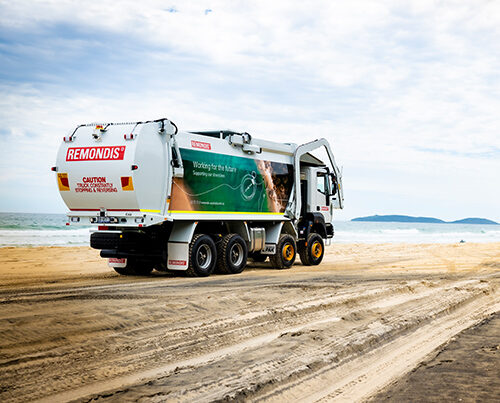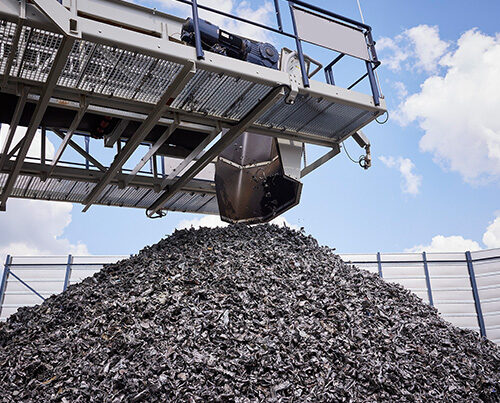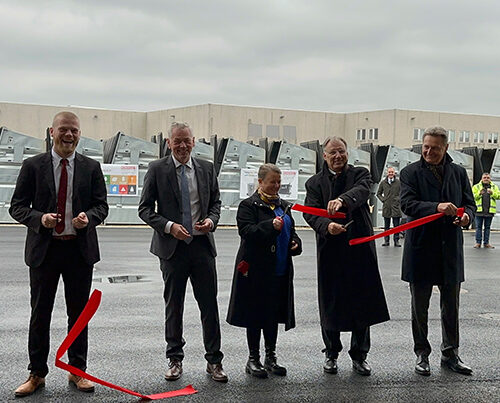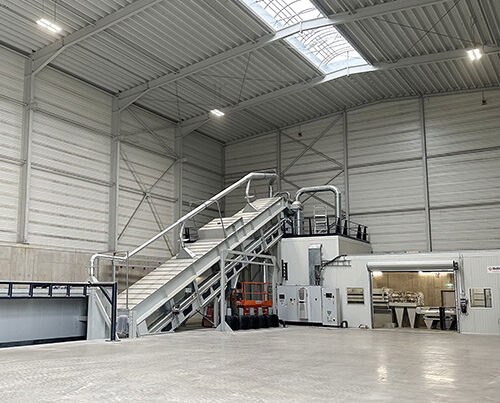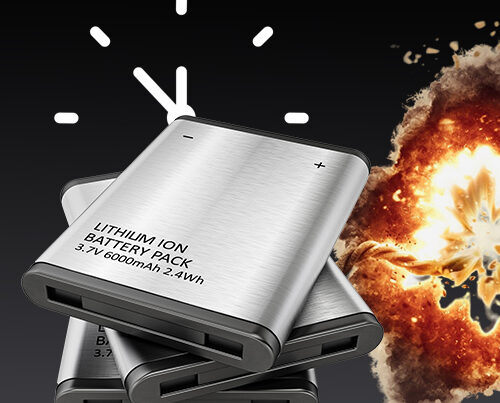Philippe Girard is managing director of the Group’s French subsidiary REMONDIS S.A.S. RE:VIEWS spoke to him about the current situation and the future of the French circular economy after the French presidential election.
RE:VIEWS: Mr Girard, as the Directeur Général of REMONDIS S.A.S., you are responsible for REMONDIS’ operations in France. The second round of voting for your country’s next president has just come to an end while we are having this interview. It would seem that Emanuel Macron has won the election. Do you believe that this result will impact on the French circular economy and what are you expecting to happen?
Philippe Girard: Over the last five years, the Government – which has now been relelected – has clearly been promoting France as a country of opportunity for foreign investments. The Choose France Summit that was held in Versailles in 2018 brought together business leaders from 140 different firms including REMONDIS as one of the leading recycling companies in Europe.
This summit is being held again in June 2022 and has new ambitions regarding the decarbonisation of the economy. The last summit was certainly successful as it led to 21 projects with a total investment volume of 4 billion euros.
The old – and the new – Government will continue along the path it has set itself, which also includes further promoting the circular economy and the targets set out in the European Green Deal. France has also recognised the need to continuously intensify its recycling activities. The Franco-German partnership in the field of recycling will, therefore, only be strengthened.
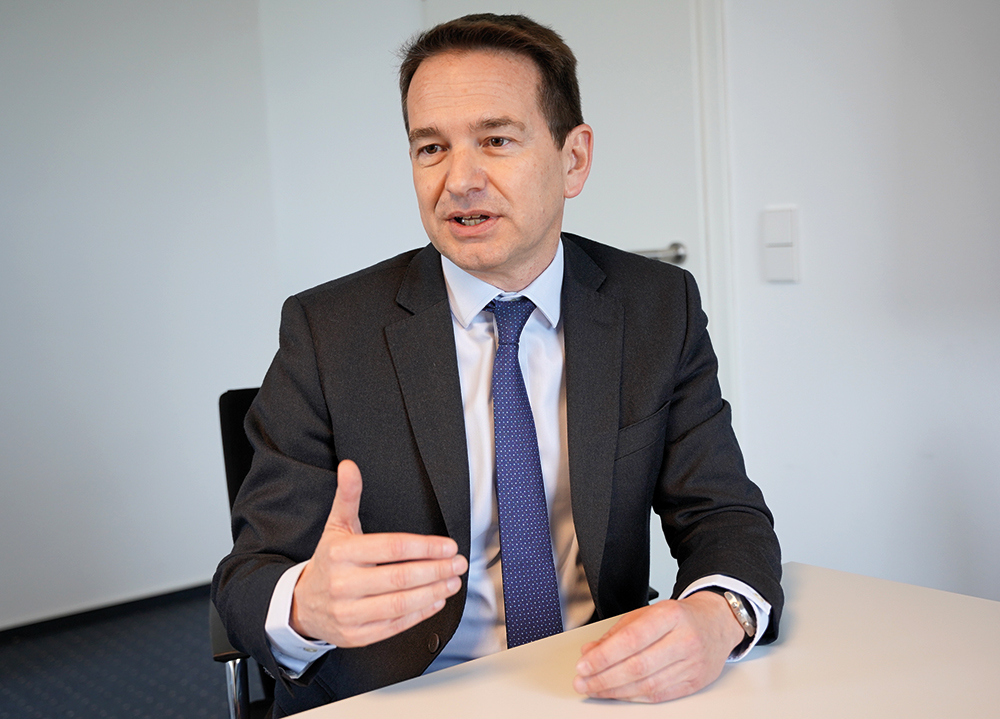
RE:VIEWS: Could you give a quick summary of REMONDIS’ activities in France – where it is located, what fields it operates in?
Philippe Girard: REMONDIS has 232 employees in France and had a turnover of 40 million euros last year. For 20 years now, REMONDIS has been operating in France via its business, REMONDIS France SAS. The company collects and treats 25,000 tonnes of hazardous waste per year and also has contracts with public sector customers such as CAB, the Communauté d’Agglomération de Beauvais. Every day, the 51 members of staff deliver customer-oriented services from their five business locations, which, of course, have all the necessary environmental permits.
The most important step made by the company within France’s public sector was the acquisition in 2020 of a 5.5% share in Semardel, a firm based near Paris. Semardel is a Société d’Economie Mixte – known simply as an SEM. That is equivalent to a public private partnership. Semardel operates in the fields of waste collection, the recycling of organic waste and energy recovery. It has a workforce of 570 employees and had a turnover of 120 million euros in 2021.
Thanks to Semardel’s shareholder structure, we not only have direct access to large regional players, such as Syctom, but can also strengthen our existing partnership with the French public institution CDC, the Caisse des Dépôts et Consignations.
This partnership with the CDC began back in 2019 when the RETHMANN Group became a shareholder in Transdev. It is key for our future development in the country because CDC owns many shares in a variety of utility companies in France that operate in the areas of waste, water and wastewater treatment.
And so REMONDIS continues to steadily develop its business in France while my home country turns into a genuine growth market for the circular economy. This can also be seen at our two subsidiaries REMEX and REMONDIS Electrorecycling SAS. REMONDIS Electrorecycling has a facil-ity in Troyes that recycles 40,000 tonnes of waste electrical and electronic equipment every year making it one of the leading businesses on the French market.
Konrad Adenauer and Charles de Gaulle signed the Elysee Treaty on 22 January 1963. This made Germany and France the most important partners in Europe with this Franco-German friendship developing into a key engine for economic growth.
RE:VIEWS: The business faces strong competition in France with Veolia, Suez, Derichebourg and other firms. Unlike here in Germany, where the Cartel Office is even sceptical about small-scale takeovers, the authorities in France would appear to welcome such mergers and even actively support them. The merger between Veolia and Suez is the most prominent example of this. Experts are saying that only big companies will have a realistic chance of overcoming global problems such as climate change and protecting our planet’s natural resources. Would you say that the future of modern waste management and recycling will be found in France?
Philippe Girard: A modern and a better circular economy is not just a topic for the 450 million people living in Europe but is absolutely essential for a world with 8 billion inhabitants. Large firms are better prepared to respond to markets such as Eastern Europe, South America, Africa and Asia. Which is why both France and Germany are the innovative places today where state-of-the-art concepts should be developed – acting effectively like a technology display cabinet.
What’s more, the way the French waste market is organised is being completely changed. In contrast to the water and wastewater sector, it is still very much atomised. Our team recently drew up a detailed map of the market that showed over 70 MidCap firms. Large companies like Veolia, Suez and Paprec are now looking beyond France’s borders when it comes to mergers and takeovers. Which clearly opens up some interesting opportunities for REMONDIS.
RE:VIEWS: What can we learn from France as far as recycling is concerned? And what, if anything, can France learn from Germany?
Philippe Girard: The French are just starting to collect municipal organic waste separately from other waste streams. Germany has been doing this since 2015 and already collects 4.5 million tonnes per year. REMONDIS and SARIA are currently working on this topic in France and can draw on the years of experience they have gathered in Germany.
Germany still has a federal structure which means that the regulations and framework conditions can differ from German state to German state. In this point, France is organised in a more central and clearer way which makes it easier to develop large-scale projects such as plastics or battery recycling schemes. They both have their advantages and disadvantages which is why the key to success also lies in being able to adapt to the different conditions and to have a deep understanding of the cultural idiosyncrasies. This is where the long-standing Franco-German friendship really pays off. It is the EU’s engine and together we will succeed in making Europe more sustainable.
RE:VIEWS: Is there one particular area of the waste management sector that you believe will make some big advances over the next 10 years?
Philippe Girard: It’s France’s goal to halve the amount of waste it sends to landfill between 2010 and 2025. The reductions reached so far have been minimal which means that a lot more must be achieved over the coming months, especially by developing plants that can burn RDF.
Many targets and projects have been announced over the last few weeks regarding plastics recycling and a reduction in plastic use. This includes, for example, recycling all plastic waste by 2025 and banning single-use plastics by 2040. A number of chemical recycling plants should be set up to achieve this. Whether they actually materialise will primarily depend on the political framework conditions and the price of oil over the coming months.
What’s more, in contrast to the well-established mechan-ical recycling systems, chemical recycling has yet to show that it can generate genuine recycled products and not just some kind of pyrolysis oil that can only be burned.
The first thing that we must all work towards together is to become less dependent on imports of raw materials. The circular economy can make the most effective contribution here.
RE:VIEWS: The circular economy is beginning to decarbonise its operations in Germany, particularly in the area of logistics. What stage is France at? Could Transdev help out here?
Philippe Girard: France is developing in a similar way to Germany as far as waste management logistics are concerned. Here, too, our diesel-run fleets are gradually being replaced with lorries run on CNG, electricity and hydrogen. Practically all public procurement projects involving waste collections now demand that the trucks are run on alternative fuels.
Transdev could certainly help bring about this transition: firstly, by passing on its feedback to us about the new technologies it’s been using with its buses. Secondly, we could think about possibly sharing infrastructure – like charging points and workshops – for future developments. Transdev operates in 17 countries across five continents and has years of experience of public transport.
The company is already well advanced as far as decarbonising its vehicles is concerned and has the largest fleet of electric buses across Europe: over 1,000 in a variety of countries at the moment. We can benefit from the experience of our sister company in this area.
RE:VIEWS: If you could make one wish come true for Europe, where would you see the European Union in – say – 30 years’ time?
Philippe Girard: A whole host of things come to mind. The first thing that we must all work towards together is to become less dependent on imports of raw materials. The circular economy can make the most effective contribution here. No matter whether it has to do with batteries, e-waste, ferrous and non-ferrous metals, wood, plastics or mineral aggregate: what we recycle does not have to be imported and nowhere in the world does the environment have to be destroyed.
We need a uniform market with harmonised laws so that we can do this much more effectively and in a much more coordinated way. For the most part, the circular economy is organised at national level with each country having different regulations. Many things could be improved if European waste legislation was systematically harmonised and implemented in all member states.
We, at any rate, will continue to do everything we can so that Europe becomes a world leader in recycling and its model and technologies can be exported to other continents. This is precisely what our teams are working towards.
RE:VIEWS: Mr Girard, many thanks for taking the time to speak to us.
Image credits: images 1, 3, 4: Adobe Stock: vegefox.com; images 2, 5: REMONDIS







